Should I Buy a House with Japanese knotweed?
Why is knotweed a cause for concern among homeowners?
Japanese knotweed is one of the most invasive non-native weeds in the UK. It causes serious problems for homeowners and property owners for several reasons, especially when it is not dealt with early.
If Japanese knotweed is left untreated for a long time, the plant can cause damage and sometimes structural damage to buildings and hard surfaces. It can find its way through small cracks and weaknesses in concrete, brick walls and paving. The roots can also grow directly through asphalt and into drains, which may lead to costly repairs and can affect the property’s foundations and overall value.
Japanese knotweed has been found directly or indirectly at an estimated 5% of properties in the UK, and it has been recorded across most 10 sq. km areas in the country. In the right conditions it can grow up to 10 cm a day. Because it forms dense stands and shades out other plants, it can quickly take over a whole garden and crowd out native vegetation.
The survival of Japanese knotweed is key to its success as a plant, and this is what makes it so difficult to get rid of from any affected land. Simply burning it, mowing it or trying to keep it out of sunlight will not remove the problem. The underground rhizomes and thick stems allow the plant to survive and spread even after surface growth has been cut down.
In many cases, it takes a specialist company with the correct machinery, materials and herbicide treatment to manage and remove a Japanese knotweed infestation safely. Even then, it often takes two to three years or more, and if even a tiny piece of rhizome the size of a fingernail is left in place, the plant can regrow. This is why knotweed management needs a clear treatment plan and expert advice rather than a quick fix.
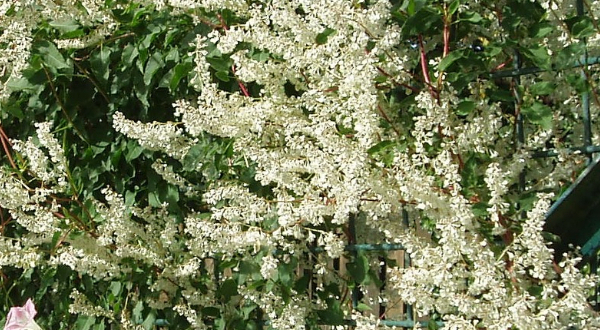
Japanese Knotweed and the Property Market
Japanese knotweed has had a strong negative effect on the housing market in England and Wales. House values on a property with Japanese knotweed on or near the land can drop by around 10–15% in some cases, depending on the extent of the problem and how it is being dealt with.
Most mortgage lenders will not lend on a house with Japanese knotweed unless there is a professional treatment plan in place with an insurance backed guarantee. From the lender’s point of view, there is an increased risk if the knotweed is not properly controlled, as it can cause damage and make the home harder to sell in the future. Some lenders will only agree to lend once they have written confirmation that a suitable plan is already in place and paid for.
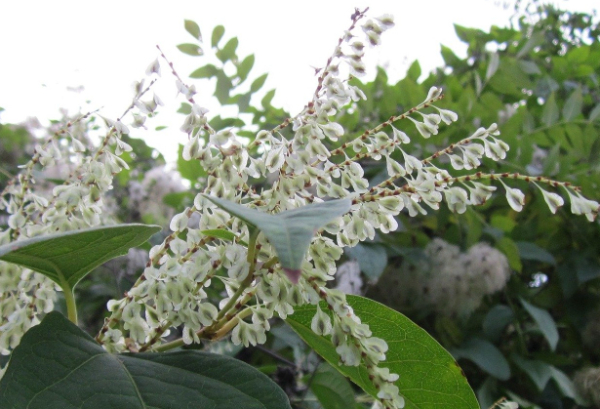
Sellers are well aware of this problem when selling a house, so they may look for cash buyers who do not need a mortgage. Buyers who understand Japanese knotweed issues will often ask for a reduction in the purchase price. They know that the seller cannot easily rely on a mortgage lender, which can put the seller under pressure and lead to a bargain sale to keep the transaction moving.
In one reported case, a property in Woolston Park in Cheshire claimed £30,000 in losses because knotweed was found on the land. There have been many similar cases and stories in the press. These show that sellers who know about knotweed must confront the situation and get proper guidance instead of hoping it will be ignored.
Should I Buy A House With Japanese Knotweed?
Buying a house affected by Japanese knotweed has clear drawbacks, but there can also be opportunities. A house with Japanese knotweed is often valued 10–15% below the local market level, which can look attractive to buyers who are willing to take on the problem in an organised way.
However, you need to understand the situation in full. The first step when you want to buy a house with Japanese knotweed is to find out the extent of the infestation. You do not want to complete your purchase and then face unexpected costs or serious damage to structures and drains. Ask yourself whether you are happy to live in a home where knotweed treatment will be ongoing for several years.
Before making an offer, it is wise to contact your mortgage lender or independent mortgage adviser. Most mortgage lenders will not lend unless there is a professional knotweed management plan already in place, often with an insurance backed guarantee that can be passed on to future buyers. The work can take 2–4 years or longer, so lenders want to know that the plan will stay in force for the full period.
You should not rely only on information from the seller’s solicitor, as they may not have the technical knowledge about the plant. Instead, arrange a Japanese knotweed survey by an independent surveyor or specialist company. The surveyor will check the garden, boundaries and any neighbouring land and then provide a report on the extent of the Japanese knotweed infestation, the risk to buildings and the recommended treatment plan and costs.
Once you have this information, you can:
- Decide if you still want to buy the property
- Ask the seller to pay for the knotweed treatment in full before completion
- Ask for a lower price so you can pay for the work yourself
In many cases, buyers will insist that the seller puts a treatment plan in place with an insurance backed guarantee and pays for the costs in order to keep the sale moving. This can help ensure that the problem is properly dealt with over time and give peace of mind to both buyer and future potential buyers.
What does Japanese knotweed do to a house?
Japanese knotweed is not likely to make a house fall down, but it can cause damage to certain structures. The invasive plant has the ability to find small weaknesses and gaps in built surfaces and gradually push through as it grows. It can lift paving slabs, damage garden walls and fences, and invade old or broken drainage pipes.
The rhizomes allow the plant to spread quickly underground, often beyond the place where the stems are visible. This makes digging it out by hand a difficult and exhausting job. It can also reappear in areas that looked clear if some roots were left behind.
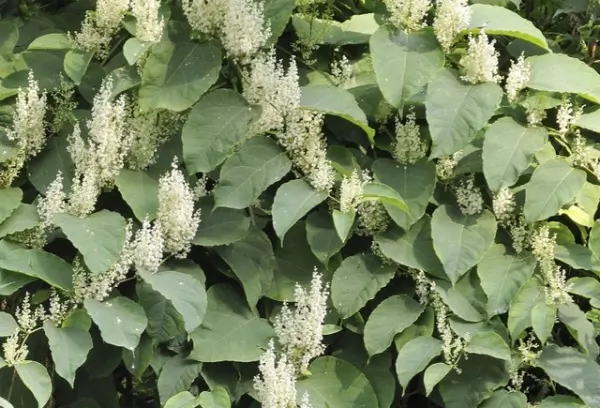
If the knotweed is ignored for too long, it may take over most of the garden, shade out other plants and reduce the enjoyment and use of the outdoor space.
In some cases, the plant can contribute to cracking of surfaces and put pressure on lightweight structures, which may be treated as structural damage in surveys. This is a key reason why lenders, surveyors and insurers in England and Wales treat Japanese knotweed as a serious issue that needs careful management.
How much does Japanese knotweed devalue a house?
The amount by which Japanese knotweed can devalue a house depends on the extent of the infestation and how close it is to the main building. If the knotweed is minor, controlled and more than 7 metres away from the house at the end of the garden, some surveyors may apply a modest reduction in value, for example around 5%, to reflect the extra work and risk.
If there is a mature infestation within 7 metres of the house, or if the knotweed has already caused visible damage to paths, walls or drains, the effect on value can be much more severe. In some cases, Japanese knotweed can make a property effectively un-mortgageable until a formal treatment plan is in place, which means the only buyers are cash buyers, reducing the price further.
If you plan to sell a home affected by Japanese knotweed, you must be completely open with buyers about the situation. It can be tempting for sellers to minimise or hide the problem because it affects the property’s value, but this can lead to legal and financial consequences later if the buyer finds out after purchasing.
Potential buyers are strongly advised to get a report from a Japanese knotweed survey expert. This will provide a clear guide to the costs needed to get rid of the knotweed, the likely timescales and the level of risk to the buildings. It will also help buyers understand what to expect each year as the treatment plan progresses.
How are buyers notified about Japanese knotweed?
When selling a house, homeowners have a legal duty to inform buyers of the presence and extent of Japanese knotweed if they know about it. Sellers and estate agents are both covered by the Consumer Protection from Unfair Trading Regulations, which means they must not hide or mislead buyers about important issues that affect a property with Japanese knotweed.
The TA6 Property Information Form is the main document used to pass this information to buyers in England and Wales. It asks a clear question: whether the property is affected by Japanese knotweed. The seller must answer ‘Yes’, ‘No’ or ‘Not known’. The ‘Not known’ option should only be used where, for example, the seller is unsure whether treatment has been carried out in the past or whether a current management plan is present.
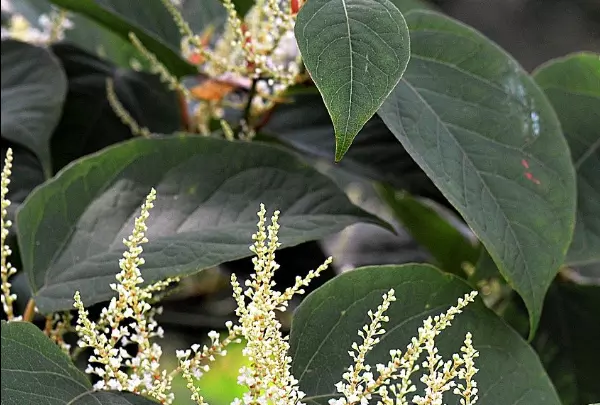
If a seller answers ‘No’ when there is in fact Japanese knotweed on the land, and the plant is later found, the buyer may be able to sue the seller for misrepresentation. The seller could be liable for the cost of removal, any devaluation of the home and other related losses. This is why honest information, supported by a proper survey where needed, is so important.
A professional estate agent or company has a duty to make buyers aware of Japanese knotweed where it is known or clearly visible. Consumer regulations say that estate agents must not leave out material information that could affect a buyer’s decision, so it is important to choose an estate agent with a good reputation for honest guidance.
Do estate agents have to declare Japanese knotweed to buyers?
Yes. All estate agents must present properties honestly and fairly. This includes declaring any Japanese knotweed on the premises and giving accurate information about the extent of the knotweed infestation and any visible damage.
In the real world, some estate agents may be tempted to play down issues to keep a sale on track. If an estate agent hides information or misleads buyers about Japanese knotweed, they can be reported to their professional body. In serious cases, this could lead to formal action or even a ban from working as an estate agent.
For buyers, it is sensible to ask direct questions and request written information about Japanese knotweed, including copies of any Japanese knotweed survey reports or treatment documents. Clear questions make it easier to show what was asked and answered if problems are found later.
Do home sellers have to declare Japanese knotweed to buyers?
In short, yes. Home sellers must declare Japanese knotweed to buyers through the TA6 Property Information Form during a conveyancing transaction. This form lets sellers list any negative issues with the property, including Japanese knotweed.
If the answer to the question ‘Is this property affected by Japanese knotweed?’ is ‘Yes’, then the seller must also state whether there is a knotweed management or treatment plan in place and whether it has an insurance backed guarantee. If so, a copy of the plan and guarantee should be provided so the buyer and their lender can review the details.
If it later becomes clear that the seller knew about the knotweed but failed to declare it, or gave false information, the buyer may be able to claim compensation for the drop in value and for treatment costs. The level of compensation will depend on how serious the infestation is and how much the lack of information influenced the buyer’s decision to purchase.
What will a mortgage lender look for?
When you are buying a house and a Japanese knotweed infestation is either present or suspected, the mortgage lender will normally want extra checks. Often, they will ask the valuation surveyor to comment on any signs of knotweed or they may ask for a specialist report before they agree to lend.
Many lenders in England and Wales follow guidance which says that lending can only go ahead if:
- A qualified specialist company has carried out a Japanese knotweed survey
- There is a written treatment plan that covers several years
- There is an insurance backed guarantee that can be transferred to future buyers
If these points are met and the infestation is being dealt with, some lenders will be willing to lend, although they may still take a cautious view. If there is no plan in place or the surveyor cannot confirm the extent of the problem, the lender may refuse to lend or may lend only once the work has started.
As a buyer, you should speak to your mortgage lender early and provide them with all the information, reports and documents that you receive. This will help ensure there are no last-minute surprises that could delay or stop your purchase.
What treatment options are available?
There are two main ways to deal with Japanese knotweed: long-term herbicide treatment and physical removal of the rhizomes by excavation.
Herbicide treatment normally takes several years. It is often the most cost-effective route and causes the least disruption to the garden. However, it requires patience, as the stems may keep appearing for some time, and the soil may still be classed as affected land even after the visible growth has stopped.
Excavation is quicker, as the affected soil is dug out and either taken to a licensed landfill or moved to a controlled area for treatment. This method is more expensive and can involve heavy machinery and major work, which may not be suitable for every home.
A good knotweed management plan will set out which approach is best in your situation, how long it will take, the likely costs, and what checks will be done to confirm that the plant has been controlled. You should always use a reputable company with experience in Japanese knotweed and ask for clear information about what is included.
What if Japanese knotweed is on neighbouring land?
Sometimes, Japanese knotweed affecting your property may have spread from neighbouring land. This can create extra issues, as treatment on your side alone may not be enough to prevent the plant from coming back.
When you are buying a house, ask the surveyor or specialist to check boundaries and any nearby land where knotweed may be present. If knotweed is found on a neighbour’s land, you may need to contact them to discuss the problem and seek agreement on joint treatment. In some cases, legal action has been taken where neighbours have refused to deal with a serious infestation that is spreading to another home.
Some homeowners will want legal guidance on their rights and duties in these cases, especially if they are facing costs or damage that they feel have been caused by a neighbour’s failure to control the plant.
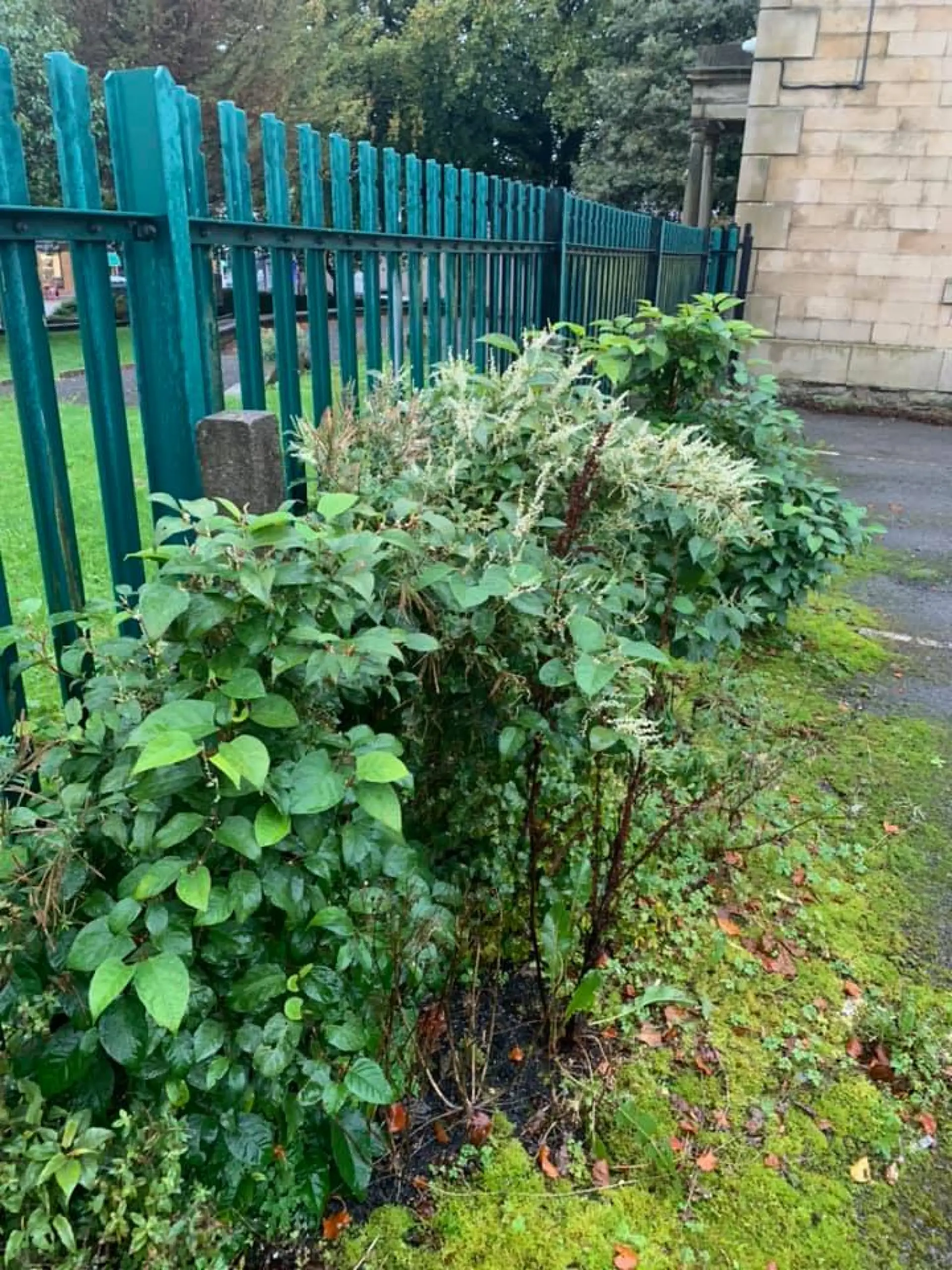
Practical steps when buying a house with Japanese knotweed
If you are thinking about buying a house or purchasing a property with Japanese knotweed, it helps to follow a clear order of steps:
First, ask direct questions of the sellers and estate agents and check the TA6 form carefully to see what has been declared. Second, arrange an independent Japanese knotweed survey so you can understand the true extent of the infestation and the risk to the home. Third, speak to your mortgage lender and provide them with all relevant documents so they can confirm whether they are willing to lend.
Once you have all the information, you can negotiate with the seller about who will pay the costs of treatment and whether the price should be reduced. Make sure any agreement is written into the contract so that the plan is in place and funded when the sale completes.
By taking these steps, you can ensure that Japanese knotweed is properly dealt with, that the costs are clear and that your new home and garden can be enjoyed with less worry about long-term issues.
Living in a house affected by Japanese knotweed
Buying a home with Japanese knotweed does not mean you cannot enjoy your property. With a proper treatment plan, good guidance and regular checks, many buyers successfully manage the plant and later sell their homes on.
You will need to keep an eye on the garden and any previously affected areas, report any new shoots to the treatment company, and follow their instructions about digging, planting or moving soil. This ongoing care can help prevent further spread and give confidence to future buyers, lenders and insurers.
In short, you can buy a house with Japanese knotweed, but you should only do so when you fully understand the problem, the costs, the work involved and the support available from experts.
Do you have a Japanese Knotweed problem? If you require Japanese Knotweed Removal in Essex or throughout the UK, contact our expert today.


